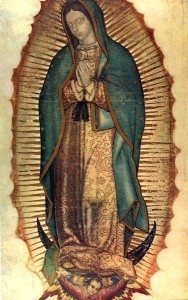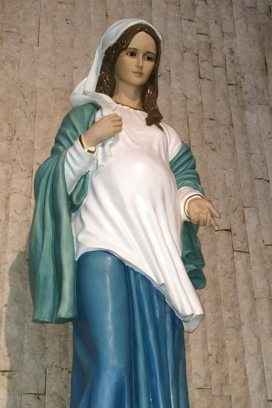
This miraculous image of Our Lady of Guadalupe is arguably the most studied representation of the Mother of God in the world.
There are two things which make it particularly unique. Firstly, it is, so to speak, a self-portrait that was miraculously handcrafted, for the Aztec people, by Our Lady herself. Her dark skin tone and straight black hair clearly illustrate her desire to be seen by the Mexican people as their mother. It is imprinted on a tilma, a typical Mexican poncho. Secondly, it is the only universally venerated image where Our Lady is depicted as carrying the Christ Child in her womb rather than in her arms.
The black sash with bow she wears around her waist was the custom among Aztec women to signify they were with child. This fact was miraculously confirmed by Carlos Fernandez del Castillo, a leading Mexican gynecologist. Upon examining the image, he decided to place a stethoscope just below the sash. He was astonished to hear the rhythmic heart rate of 115 beats per minute:1 the same as that of a baby in the maternal womb.
The secularist-minded reader will immediately discard such findings and prefer to imagine Our Lady’s motherhood as being no different from that of any other woman. Such a person therefore will see no problem in the statue below.
 This grossly naturalistic way of portraying Our Lady is the polar opposite of the discretion used by the Queen of Heaven in her “self-portrait” at Guadalupe. The way her right hand pulls away the head covering seems to be meant as an intentional movement to accent what is commonly termed among celebrity watchers as the “the baby bump.”
This grossly naturalistic way of portraying Our Lady is the polar opposite of the discretion used by the Queen of Heaven in her “self-portrait” at Guadalupe. The way her right hand pulls away the head covering seems to be meant as an intentional movement to accent what is commonly termed among celebrity watchers as the “the baby bump.”
This expression has become ubiquitous in our modern world and has led to numerous pictures of formally slender movie stars with “the bump” adorning the front covers of trashy supermarket tabloids. These frequently unwed starlets, commonly shown using tight fitting clothing to accent their degree of pregnancy, only diminish the beauty of motherhood.
Along with the emphasis on the midsection, the countenance of the statue has a discreet sultry look similar to that seen on the face of worldlings. It is a pretty face of a common woman without a trace of the supernatural so evident in the prayerful posture of Our Lady of Guadalupe. It is only by comparing the two images, however, that we can fully appreciate what a disservice such representations do to the Mother of God.
Nothing about Our Lady’s motherhood was common as this statue painfully presents her. On the contrary, the Divine Plan whereby Our Lord became flesh and walked among us was an awe-inspiring event unimaginable to the minds of men. At no point did she lose her virginity, her feminine delicacy, nor her sense of discretion. Rather than placing Our Lady up as a model for all mothers this statue merely stereotypes her in the fashion of the immodest models.
